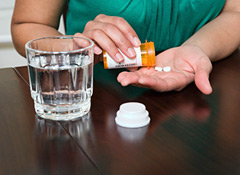Sign In

Menu
Suggested Searches
Recent Searches
Suggested Searches
Product Ratings
Resources
Chat With AskCR
Resources
All Products A-ZThe payment for your account couldn't be processed or you've canceled your account with us.
Re-activateMy account
Sign In
My account
Sign In


One of every five U.S. adults over age 18, and almost half of those over age 65, take a daily low-dose aspirin in the hope of preventing heart attacks and strokes, although many have never experienced either condition. Now, a large international study published in the January 9th Archives of Internal Medicine has concluded that using aspirin before disease has struck (primary prevention) may cause more harm than benefit to your health.
In the trial led by British researchers, over 100,000 people, average age 57, who had no history of heart attack and stroke, took a baby aspirin (81mg) everyday for six years. Participants were from nine groups in Europe, Japan, and the U.S. Researchers found that daily aspirin prevented one expected nonfatal heart attack in the large group, and had no significant effect on cancer mortality (which had been suggested in other studies). Disturbingly, these patients collectively experienced a two and a half times greater risk of internal bleeding. More specifically, for every 162 patients, the aspirin caused two cases of serious internal bleeding.

These are surprising results, given the longstanding belief by the medical community that taking a daily aspirin provided excellent cardiovascular preventative benefit with minimal risk. It is important to note that this study focused only on the benefits of aspirin in healthy adults with no previous cardiac or vascular disease. For patients who have experienced a heart attack or stroke or have cardiovascular risk factors such as high blood pressure, diabetes, or smoking, other studies have shown that the benefits of secondary prevention with aspirin outweigh the risks.
The use and dosage of aspirin in both healthy adults and those with disease or risk factors should be considered on a case-by-case basis after consulting with your doctor and pharmacist. Age, gender, risk factors and possible interactions with other medications or supplements must all be considered in making a well-informed decision regarding aspirin prevention strategies for you.
Although it is readily available, it's not wise to take daily aspirin on your own without consulting your physician, as the drug can pose significant risks. This groundbreaking study dramatically places the focus back on safety.
For more on who may benefit from strategies to prevent heart attacks and strokes, see: Consider low-dose aspirin.
Source
Effect of Aspirin on Vascular and Nonvascular Outcomes: Meta-analysis of Randomized Controlled Trials [Archives of Internal Medicine]
—Joseph Mosquera, M.D.
 Build & Buy Car Buying Service
Build & Buy Car Buying Service
Save thousands off MSRP with upfront dealer pricing information and a transparent car buying experience.
 Get Ratings on the go and compare
Get Ratings on the go and compare
while you shop